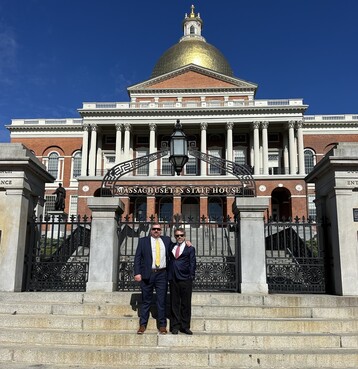At State House, Island Housing Advocates Keep Pushing For Housing Bank
Jason Graziadei •

Sensing that 2023 could finally be the year the long-sought housing bank legislation passes muster in Boston, Nantucket housing advocates are keeping the heat on lawmakers and government officials at the State House.
Last week, Nantucket's municipal housing director Tucker Holland and Nantucket Chamber of Commerce director Pete Burke testified before the Joint Committee on Revenue in support of the transfer fee legislation. They were joined by Boston Mayor Michelle Wu, Somerville Mayor Katjana Ballantyne, State Senator Julian Cyr, and others at the hearing.
"In the seven years since Nantucket has simply been seeking permission from the state to help itself, we have seen our median home price more than double — from $1.3 million to now over $3 million, our town and hospital consistently unable to fill dozens of year-round positions, and our community lose countless valued community members who contribute to Nantucket in myriad ways," Holland told the committee. "All of this traces back to housing. This optional fee is arguably the most important and significant tool you can grant to municipalities across the Commonwealth in their effort to combat their local housing crisis. The beauty of this measure is, it doesn’t cost you a thing. It takes no money out of state coffers. And, if you act on this, you are not imposing anything on any municipality. It is purely optional. If a community wants it, or needs it, it is available. If not, they need not access it."
Nantucket’s quest for the housing bank legislation has been ongoing for more than a decade, and the concept has caught on with other communities - on the Vineyard, on Cape Cod, and beyond - that have joined the fight. The island is seeking what Holland calls a modest request: a .5 percent transfer tax on real estate sales above $2 million to fund affordable housing initiatives. Had it been in place last year, it would have generated more than $6 million.
With so many communities now seeking the same type of legislation, the hope is that the state will pass a bill that allows for a "local option transfer fee" that gives municipalities the choice to adopt one or not.
"We know that transfer fees work," Holland said. "We can look no further than Nantucket and Martha’s Vineyard to see the valuable contributions they make…and without dampening real estate values or volume. In fact, all evidence to the contrary...Some people will say, the Housing Bond Bill will provide significant resources, that LIHTC can be a substantial source of subsidy and that CPA funds can be put to work. All are true statements. The problem is, as Manager Wong noted: they are not sufficient. They are not enough. We have a $500 million issue in Nantucket alone."
There is some speculation that Gov. Maura Healey could include a local option transfer fee to her housing bond bill that is set to be unveiled this month.
Nantucket voters earlier this year endorsed a permanent $6.5 million tax override for affordable housing initiatives that will replenish the coffers of the town's Affordable Housing Trust each year with dedicated funds toward its initiatives. The vote came on the heels of voters endorsing more than $70 million in taxpayer funds for affordable home ownership and rental projects since 2018.
Despite the recent wins for affordable housing, progress has been slow in putting “heads in beds.” Those funds have resulted in housing for 36 year-round households over the past four years, and another high-profile project - the Wiggles Way affordable apartment complex off Fairgrounds Road - will soon be completed. But several properties acquired by the town’s Affordable Housing Trust since 2019 - including lots on Orange Street, White Street, Bartlett Road, and off Vesper Lane - remain undeveloped as the trust works through the protracted government procurement and RFP (request for proposals) process simply to settle on a design for the affordable housing projects that will one day occupy those properties.